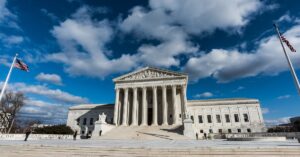Trump Court temporarily blocks Trump move to fire Biden-appointed Special Counsel boss
Trump recently announced that he wanted to remove Hampton Dellinger as the head of the Office of the Special Counsel.
Dellinger, who Joe Biden appointed, sued to have himself reinstated, a suit that is now before the Supreme Court.
Can Trump Fire Anyone?
The court must finally answer this question, but this issue is far from black and white.
Trump can more or less replace presidential appointments, but there are some exceptions to that rule, and this does appear to be one of them.
Most federal workers are also protected from being fired, even if they express a different ideology from a sitting president.
The Trump administration is trying to work around this by downsizing departments and laying off excess workers after offering a massive buyout package before announcing the layoffs.
Dellinger Responds to Firing
Henry Kerner preceded Dellinger as the Special Counsel. He was appointed by Trump and served his entire term, which included nearly three years under the Biden administration.
Trump clearly does not want a Biden appointee in this key role, so he is now trying to remove Dellinger, a move challenged by Dellinger, citing the only way he can be removed is for poor work performance, which was not noted in the letter he received relieving him from duty.
In turn, Dellinger sued to be reinstated. His suit stood up in the lower courts, outraging the Trump administration, which responded, “Until now, as far as we are aware, no court in American history has wielded an injunction to force the president to retain an agency head whom the president believes should not be entrusted with executive power and to prevent the president from relying on his preferred replacement."
The Trump administration has now appealed to the Supreme Court.
Supreme Court Pauses Firing
Trump surely thought the Court would rule in his favor in this case, but that has not yet happened.
The Court paused Dellinger's firing, which will allow him to return to work until at least February 26.
As expected, at least two of the liberal justices on the Court, Justices Sotomayor and Jackson, have already stated they would rule against the Trump administration. Justices Gorsuch and Alito are not convinced the lower courts have the authority to challenge the president's decision in matters such as this.
The ruling by the court will allow the injunction against the firing to remain in place until its deadline (Feb. 26), when the district court will decide whether to extend the injunction. Once the lower court makes its final ruling, the Trump administration will be able to appeal to the Supreme Court again, so this is far from over. Under Justice Roberts, we have seen time and again that the Court wants all legal remedies in the lower courts exhausted before taking on a such a case, so don't expect anything different here.




